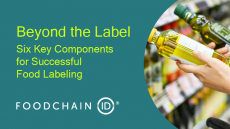Independence obtained, says head of EU food agency
food risk agency, Geoffrey Podger affirms the authority has already
cleared the first hurdle, independence, reports Lindsey
Partos.
Set up 18 months ago, as the hub of key food safety regulations freshly passed into European law, the mandate of the European Food Safety Authority (EFSA) is to provide independent risk assessment opinions on questions fielded by the Commission, Parliament and member states.
But ongoing criticisms that EFSA can not achieve true independence are quicly brushed off by Podger.
"EFSA has been through the tricky stage, and has now established itself as an independent entity," says the executive director.
In addition, the 18-month old authority has issued nearly 200 opinions and invested considerable time in communicating with stakeholders, member states, national authorities as well as the European institutions, he tells FoodNavigator.com.
Essentially, EFSA rests on four pillars: the management board, the executive director Geoffrey Podger, an advisory forum composed of member states, and the scientific committee and eight panels.
Open to scientists around the world, EFSA has already selected experts for the 21-member panels, that include a busy GM team, that are yet to reach full capacity.
The job of the experts, selected from around the globe, is to carry out an extensive risk assessment, from which to formulate a scientific opinion. Once created, the opinion returns back to the risk managers, such as the European Commission or European Parliament.
While the majority of questions have so far emanated from the Commission, Parliament and member states have started to approach EFSA.
"Parliament has had a particular interest in dioxins, and now current issues are concerned with the BSE and goats," comments Podger.
According to the executive director member states have not asked many questions, although the French recently called for an opinion on the risk status of Portugal regarding BSE.
Some panels have had more work than others, for example the group of scientists in charge of opinions on the sensitive subject of genetically modified crops.
EU procedure allows for member states to lodge objections on environmental or human health grounds against proposed new GMO authorisations, that have come up through one or more member states.
If these objections are not withdrawn by the end of a specified period, the Commission will ask the EFSA for a risk assessment.
So far, EFSA has assessed GMOs where the requested uses have not included the actual growing of biotech crops - an extremely sensitive area which has split member states. But 2005 is expected to bring this into play.
With an expected 170 opinions due in 2005, recruitment of high level scientists is still a priority for Podger.
One small bureaucratic hitch that needs to be resolved is the Parliament's budget committee that has dictated, to a raft of differnt European institutions, that new recruits need to come in at a lower grade.
We need to find an amicable position with the Parliament. In our experience MEPs have been supportive of EFSA, so we believe a solution is likely, says Podger.
The executive director is looking to nearly double the current 102 staff, to around 200 by the end of the year.
There is proof the agency has the support of the MEPs, reflected in their signing off for 2005 of a "very reasonable" €38 million budget.
After a tug of war battle between a handful of member states pushing to house Europe's first food agency, Parma won the game and will now welcome Podger, and his team, on Monday.

















